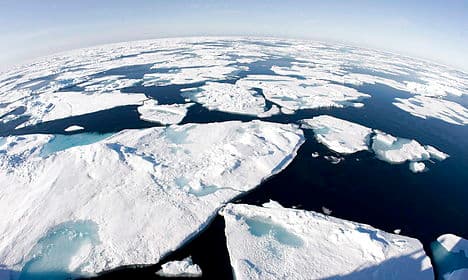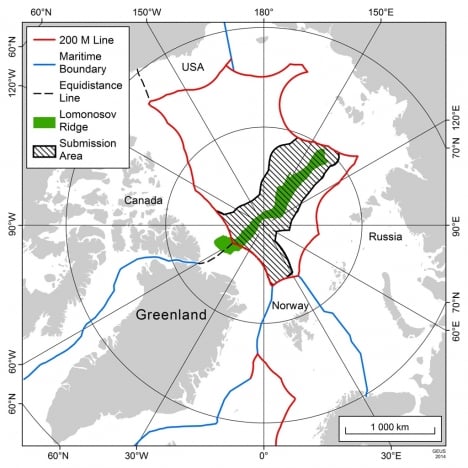Denmark makes 'provocative' Arctic claim

Denmark is making an historic push to lay claim to the North Pole and the Arctic seabed, the Foreign Ministry has announced, but how will that go over with the Russians and Canadians?
Together with Greenland, Denmark plans to file a submission on Monday that will redefine the boundaries of the continental shelf in the Arctic Ocean.
Denmark’s claim covers approximately 895,541 square kilometres – or about 20 times the size of Denmark – and will be formally submitted to the Commission on the Limits and the Continental Shelf (CLCS). The map below shows the area in question (click for larger view).
“The submission of our claim to the continental shelf north of Greenland is a historic and important milestone for the Kingdom of Denmark. The objective of this huge project is to define the outer limits of our continental shelf and thereby – ultimately – of the Kingdom of Denmark,” Foreign Minister Martin Lidegaard said in a statement.
With the move, Denmark will become the first country in the world to attempt to claim outright ownership of the North Pole.
Russia and Canada have made overlapping claims to the North Pole and large swathes of the Arctic that the US Geological Survey thinks could hold vast amounts of undiscovered oil and natural gas reserves.
Denmark’s claim to the Arctic seabed is the result of 12 years of planning and, according to Politiken, 330 million kroner ($55.2 million) spent on research.
States are entitled to claim the continental shelf extending to 200 nautical miles from their coast. According to the Foreign Ministry, the new area north of Greenland is the fifth claim Denmark has made for a continental shelf that extends behind the 200 nautical mile mark. The first submission was made in April 2009, with subsequent claims coming in December 2010, June 2012 and November 2013. Those previous claims are currently under consideration, so the Foreign Ministry said “it is therefore difficult to predict” when the new submission will be considered. Politiken reports that the process could take up to 15 years.
Although both Canada and Russia have also made claims to the area over the years, Lidegaard said that Denmark has had “very good cooperation” with its “Arctic neighbours”.
“This is not an aggressive action. It is an attempt to honestly and accurately present geological data,” he told Politiken.
Denmark’s new claim was criticised by Canadian professor Michael Byers, one of the world’s leading experts on Arctic sovereignty.
“It is ironic that the only country that right now could be said to be acting provocatively in the Arctic is Denmark. That is out of character with the country’s tradition of constructive diplomacy,” Byers told Politiken.
He added that the move could especially irk the Russians who are preparing their own final bid to the CLCS. The Russian bid, according to Byers, doesn't go as far as Denmark's and the more aggressive push by the Danes could be a bargaining ploy to get the Russians to agree to a mutually beneficial deal.
Canada too has said it will try to extend its territorial claims in the Arctic to include the North Pole, although it hasn't yet fully mapped its claim.
In August, Canadian Foreign Affairs Minister John Baird visited Denmark and Norway to discuss claims to the Arctic.
Baird called the Arctic “fundamental to Canada's national identity”.
Comments
See Also
Together with Greenland, Denmark plans to file a submission on Monday that will redefine the boundaries of the continental shelf in the Arctic Ocean.
Denmark’s claim covers approximately 895,541 square kilometres – or about 20 times the size of Denmark – and will be formally submitted to the Commission on the Limits and the Continental Shelf (CLCS). The map below shows the area in question (click for larger view).
“The submission of our claim to the continental shelf north of Greenland is a historic and important milestone for the Kingdom of Denmark. The objective of this huge project is to define the outer limits of our continental shelf and thereby – ultimately – of the Kingdom of Denmark,” Foreign Minister Martin Lidegaard said in a statement.
With the move, Denmark will become the first country in the world to attempt to claim outright ownership of the North Pole.
Russia and Canada have made overlapping claims to the North Pole and large swathes of the Arctic that the US Geological Survey thinks could hold vast amounts of undiscovered oil and natural gas reserves.
Denmark’s claim to the Arctic seabed is the result of 12 years of planning and, according to Politiken, 330 million kroner ($55.2 million) spent on research.
States are entitled to claim the continental shelf extending to 200 nautical miles from their coast. According to the Foreign Ministry, the new area north of Greenland is the fifth claim Denmark has made for a continental shelf that extends behind the 200 nautical mile mark. The first submission was made in April 2009, with subsequent claims coming in December 2010, June 2012 and November 2013. Those previous claims are currently under consideration, so the Foreign Ministry said “it is therefore difficult to predict” when the new submission will be considered. Politiken reports that the process could take up to 15 years.
Although both Canada and Russia have also made claims to the area over the years, Lidegaard said that Denmark has had “very good cooperation” with its “Arctic neighbours”.
“This is not an aggressive action. It is an attempt to honestly and accurately present geological data,” he told Politiken.
Denmark’s new claim was criticised by Canadian professor Michael Byers, one of the world’s leading experts on Arctic sovereignty.
“It is ironic that the only country that right now could be said to be acting provocatively in the Arctic is Denmark. That is out of character with the country’s tradition of constructive diplomacy,” Byers told Politiken.
He added that the move could especially irk the Russians who are preparing their own final bid to the CLCS. The Russian bid, according to Byers, doesn't go as far as Denmark's and the more aggressive push by the Danes could be a bargaining ploy to get the Russians to agree to a mutually beneficial deal.
Canada too has said it will try to extend its territorial claims in the Arctic to include the North Pole, although it hasn't yet fully mapped its claim.
In August, Canadian Foreign Affairs Minister John Baird visited Denmark and Norway to discuss claims to the Arctic.
Baird called the Arctic “fundamental to Canada's national identity”.

Join the conversation in our comments section below. Share your own views and experience and if you have a question or suggestion for our journalists then email us at [email protected].
Please keep comments civil, constructive and on topic – and make sure to read our terms of use before getting involved.
Please log in here to leave a comment.